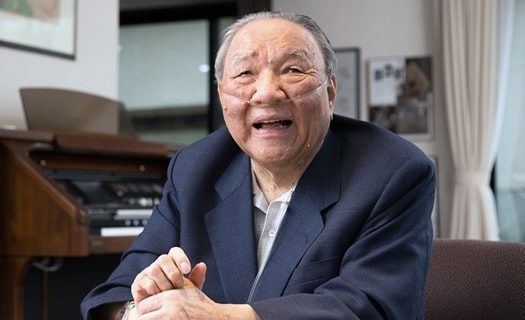My first mentor was Ikutaro Kakehashi, founder of Roland & Roland DG Corporations. He passed away earlier this April at age 87. Known as “Mr. K” in the music industry, he was a great Japanese visionary in the digitalization of musical instruments in the 1980s and understood better than most the changes brought about by the Third Industrial Revolution.
Yes, the third one.
Before the Fourth Industrial Revolution of IoT, AI, and big data, there was the Third Industrial Revolution. Techopedia describes this as the “advancement of technology from analog electronic and mechanical devices to digital technology”—basically, when manufacturing went digital. Mr. K played a huge part in the transformation of music from analog to digital.
When the international media (BBC, Fortune, The Guardian, The Washington Post) reported the sad news of Mr. K’s passing, they reviewed his contributions to the music world. He received a Grammy in 2013 for his contributions to electronic music. Dave Smith, founder of synthesizer company Sequential Circuits, said, “He was just an amazing man, a good friend, a very good competitor, and just innovative all the time.”
In addition to driving the global communication standard for musical instrument digital interface (MIDI) indstruments with Smith, Mr. K’s creations changed the world of music. His TR-808 drum machine and TB-303 synthesizer kicked off the electronic music movement. They were used by Duran Duran, Depeche Mode, and Krafwerk. His electronic music instruments and studio equipment formed part of the musical success of Marvin Gaye, Soft Cell, Tangerine Dream, The Human League, Jean-Michael Jarre, Herbie Hancock, Prince, Sting, Andy Summers, Phil Collins, Oscar Peterson, Pat Metheny, Kanye West, and Mr. K’s much admired friend Ray Charles. Many computer games, including Apple products, make sounds derived from the SC-55 Sound Canvas, the first MIDI sound module. As a result, Mr. K was inducted into Hollywood’s Rock Walk of Fame (2000) and awarded an honorary doctorate by Berklee College of Music (1991) for redefining the world of modern music.
Mr. K went on to play a part in the Fourth Industrial Revolution, as well, focusing on the innovation of cyber-physical interfaces and developing sensors and digital processors. His man-machine interfaces are part of the the revolution’s enabling technologies.
Mr. K set up Roland Corporation in 1971 and Roland DG in 1981 in Osaka, both of which later moved to Hamamatsu. Both companies are still leaders in their respective sectors. I had the great fortune to join the company in 1985 at the age of twenty-four and learn from Mr. K’s cutting-edge vision of business. More than a visionary and innovative engineer, Mr. K was a global leader for the evolution to today’s digitalization. Indeed, he was a great business philosopher.
There are eight lessons he taught me that I’ll never forget. More than sentimental, they are all are essential to succeed in the Fourth Industrial Revolution.
1. Every change brings an opportunity.
Mr. K was a big driver of change. His view was that every change presented an opportunity. He often said that “change” and “chance” only differ by one letter, and it is up to us to know how to find both. He was so true to this innovative attitude that, in 2013, at the incredible age of eighty-three and with his health beginning to wane, he set up the new digital video-audio devices company ATV Corporation, pioneering new fields with digital audio and video creative innovations. Music digitalization continued to flower under his leadership, right to the end.
2. Be the best, rather than the biggest.
Instead of pursuing growth at any cost or falling into the trap of commodification, Mr. K encouraged everyone to be the best in everything they did. His vision of developing activities in market niches through digital solutions also entailed being market leader, which guaranteed above-market growth and kept the company’s competitive muscle still strong even today.
3. We live in an age with no samples.
We live in an era of constant change. We can’t rest on the laurels of success or rely on past references. We must learn from our clients. Rather than emerging from R&D departments, true evolution comes from clients who share their creativity and future needs.
4. Embrace co-creation.
By involving clients from the outset in the product development phase—including many of the musicians mentioned above, who passed through Roland’s R&D center in Hamamatsu to create new sounds and instruments—Mr. K was one of the first drivers of co-creation. This led the company to building a reputation of developing friendly products that were incredibly easy to use and highly reliable.
Mr. K used to say, “Users don’t know technological limitations, but inspire us to follow new paths.”
5. Learn from mistakes.
We learn more from mistakes than successes. In moments of crisis, Mr. K always looked for a way to get something positive from the experience. He made a point to take into account the emotional factor by involving people. After navigating our way through one particularly severe crisis, he told me: “We’ve learned from the experience. Now reset the past and work for the future.” We should leave the negative emotional baggage behind us, take what we’ve learned, and move forward.
6. Understand the value of co-petition.
The development of MIDI was a clear example of Mr. K’s vision of collaborating with competitors in the pursuit of music digitalization. He openly collaborated with Dave Smith from Sequential Circuits in the development of the MIDI, connecting for the first time two keyboards from different companies: a Prophet 600 analogue synthesizer and a Roland JP-6. They openly invited other companies in the industry to join in development, including Korg, Kawai, and Yamaha. The goal was a networked communication standard, and the vision did not end there. They also invited the personal computer industry, then still in its infancy. MIDI features were adapted to several early computer platforms, including Apple II Plus, IIe, Macintosh, Commodore 64, Amiga, Atari ST, Acorn Archimedes, and PC DOS.
None of this would have been possible if Mr. K had kept everything in house, or even insisted on working only with partners. Competitors coming together can create something truly revolutionary.
7. Think global, act local—be “glocal.”
From the outset, Mr. K designed an organization in which the different perspectives of global and local could come together and understand each other to create new value. He often said, “Customers are local and want to have relationships with local people. Our people on the ground in different countries know the market. The market is not an abstract entity—it’s formed by people, customers and competitors who act in different ways according to their countries and cultures.”
True to his glocal vision of local executives’ empowerment, the decision-making power enjoyed by presidents and CEOs—which I had the opportunity to enjoy in my first local role in Spain—was great. So was the peer-to-peer communication between the executives of each country. These things enabled the creation of strong distribution channels that were made all the more competitive by adapting to each setting and enabling success cases to be quickly shared, building strength even in times of economic turmoil.
8. Listen to the young, for they are the next leaders.
Every time he visited an office in another country, Mr. K had an informal dinner with local staff to share his vision. While doing so, he would invite the newest recruit to sit next to him so that he could listen to their ideas. Veteran staff, familiar with this custom, delighted in seeing surprise on the new recruit’s face as Mr. K approached and invited them to sit beside him at the place of honor.
I still remember when this was me. Mr. K invited me to sit next to him in a dining room full of about fifty people from the company. I was twenty-six years old, and for a moment I froze. He said, “Come and sit next to me. We’re incredibly proud that you have joined the Roland family, and I’d like to hear your views.” Once seated, he asked me, “Are you happy to be with us? What can we do to make you happy?”
One of the slogans Mr. K coined was “cooperative enthusiasm for all stakeholders.” Since then, I have asked both employees and customers the same two questions he asked me. Now I ask my MBA students the same. Why? Because if you make your people happy, they will make your customers happy.
More than a visionary engineer and great entrepreneur, Mr. K put people and customers at the heart of strategy. Without him, music digitalization—and the world of business—might not be what it is today.
Thank you, Mr. K. For everything.



